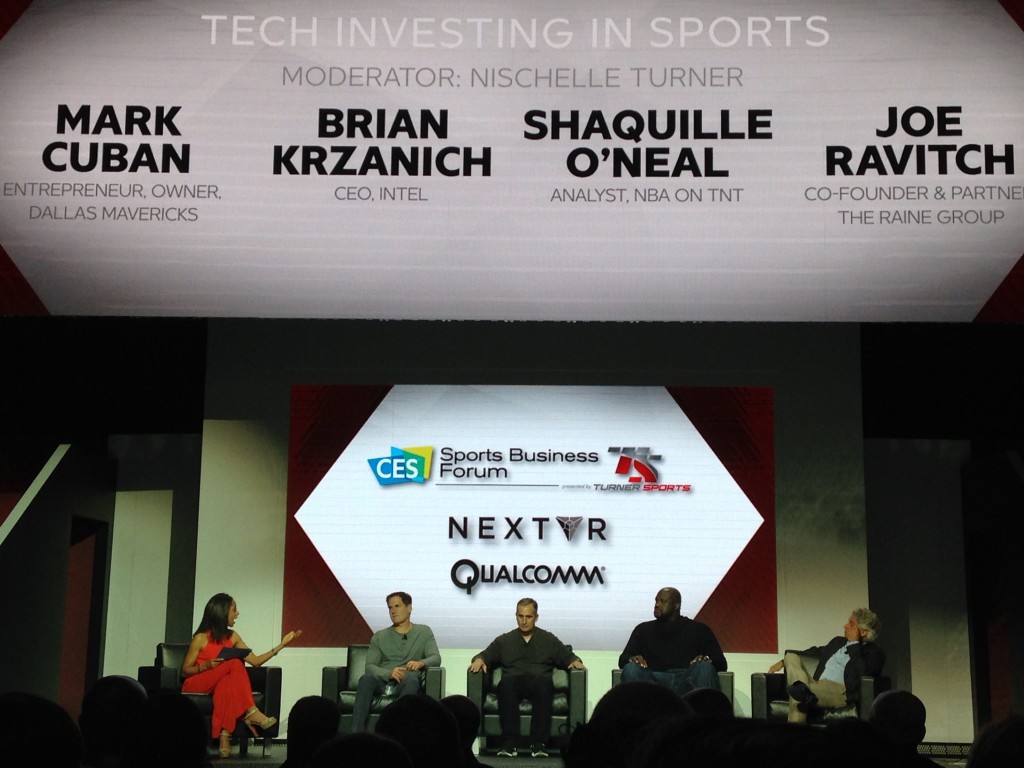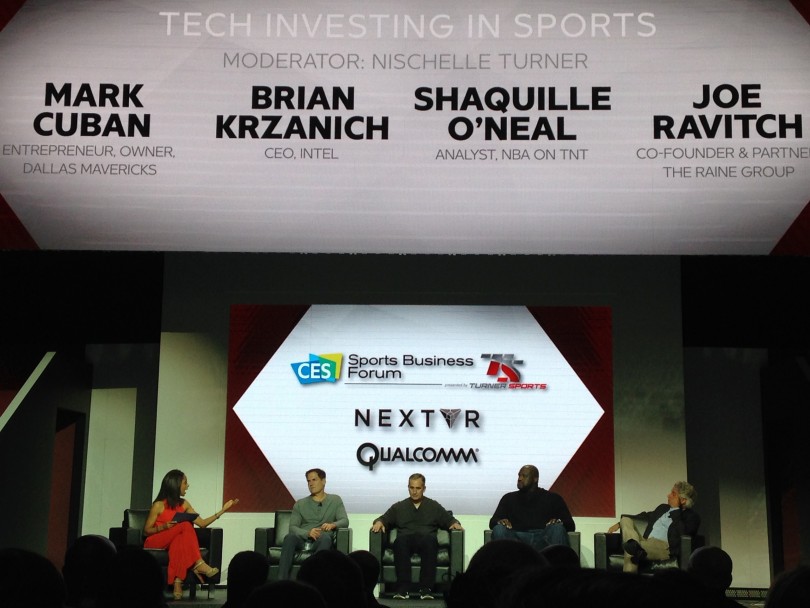By Stacy Schoonover and Michael Sol Warren
BU News Service
The worlds of sports and technology crossed paths at CES on Thursday as industry leaders and experts fielded discussions that ranged from how virtual reality technology will affect how people watch sports to how advances in technology will impact the in-venue experience.
Here’s a roundup of the sessions.
Commissioners’ Panel on Sports and Technology
In a discussion moderated by Turner Sports host Ernie Johnson, National Basketball Association Commissioner Adam Silver and Major League Baseball Commissioner Rob Manfred talked about how their respective leagues have been affected by changes in technology.
Both Silver and Manfred agreed that changes in technology have had positive impacts on their leagues. Silver noted that high quality live streaming to phones and tablets has made the NBA accessible to a larger audience.
Manfred said that the most important change for MLB was former commissioner Bud Selig’s decision to consolidate the league’s Internet properties. Manfred said that the move is key to reaching a younger audience, acknowledging that MLB’s audience demographic skews older in comparison to other sports.
The discussion then turned to fantasy sports and the debate over whether it’s legal. Both Manfred and Silver agreed that it should be legal and regulated, and that the industry serves as another form of fan engagement.
“If you have a vested interest in an outcome, you’re much more invested,” Silver said.
Updating the In-Venue Experience
The second panel of the morning featured Qualcomm Executive Chairman Paul Jacobs and Formula E CEO Alejandro Agag. Moderated by Dana Jacobs, a host and reporter for CBS Sports and Spike TV, the discussion focused on what steps sports executives and technology companies could take to improve the in-venue experience for sports fans.
Agag and Jacobs made it clear throughout the discussion that reliable Wi-Fi connectivity is the most important thing that teams and sports organizations can provide for fans. Jacobs said that teams and organizations can now count on their fans having smartphones, and that they need to serve the fans by have reliable Internet connections. Jacobs said the biggest challenge in this is retrofitting older arenas with the needed technology.
Agag said that once fans are connected to the Internet, teams and organizations need to have something for them to use. He used an example from his own organization, saying that Formula E allows fans to vote to give their favorite drivers a temporary speed boost mid-race.
The Future of Sports Content
Executive Chairman of NextVR Brad Allen, Sacramento Kings owner Vivek Ranadive, Uninterrupted CEO Maverick Carter and Verizon Senior Vice President of Consumer Products Brian Angiolet sat down to talk about what needs to be done to keep sports popular into the future. Moderated by Translation Founder and CEO Steve Stoute, the panel’s main conclusion was that the content of sports must continue to grow in order to keep pace with technology.
A big focus for this panel was the integration of virtual reality technology into the sports experience. All four panel members agreed that while virtual reality will never be a substitute for actually attending sporting events, it can serve to grow a sports popularity and fan base.
Ranadive gave an example of NBA games being streamed live to people in India who had virtual reality headsets. He said that while these people will likely never have the chance to see an NBA game in person, virtual reality can give them a good alternative.
Angiolet said that virtual reality technology will have a positive impact on live attendance because it gives people a taste of what the live event is like.
Tech Investing in Sports
Leading innovators in the sports-technology industry highlighted the current and future growth of sports technology during the morning’s fourth and final panel. The four panelists were Mark Cuban, owner of the Dallas Mavericks; Brian Krzanich, CEO of Intel; Shaquille O’Neal, Turner Sports studio analyst; and Joe Ravitch, co-founder and partner of The Raine Group. The panel was moderated by Nischelle Turner of Entertainment Tonight.

Turner began by asking how adding technology increases the value of a team. Cuban said that technology makes the consumer experience better and increases the value of the arena experience versus watching a game from home. He said the energy makes watching sports live unlike any other experience.
“The energy you feel when you walk into the arena is the most valuable part of our product,” Cuban said.
Cuban acknowledged that achieving this isn’t easy.
“Our biggest challenge is how to get people to not look at their phones,” Cuban said. “When people are looking at their phones, we lose them.”
The panel members also touched on what they look for when investing in new sports technology. Cuban said he looks for game-changers and new areas of growth. O’Neal said he looks for products that are affordable and for everyone. Ravitch said he focuses on competitive advantage and passion. Krzanich said that because of his engineer background, he looks at the root technology and then assesses uniqueness.
A hot-button topic during the panel was daily fantasy sports. Ravitch said Draft Kings will continue to grow in the sector and that he does not foresee a plateau. He said that Draft Kings currently reaches fewer than five percent of fantasy-sports players and that there will be much more growth as the company expands in the market.
Cuban took on the current political debate surrounding daily fantasy sports when he said that the business is perfectly legal and implied that the politicians working against the industry were doing so for political gain.
“Its not gambling. You have to be an idiot to think it’s gambling,” Cuban said.
Cuban said that he and Ravitch disagree on whether eSports is actually a sport. Cuban strongly believes eSports is a sport because it does take training, highly developed skills and strong hand-eye coordination.
“eSports is more of a sport than golf,” Cuban said.
O’Neal said that if it is strenuous, it’s a sport. His example of this was when he said NASCAR wasn’t a sport. O’Neal said that after he drove a race car against NASCAR driver Dale Earnhardt, Jr. on his television show Shaq Vs. he was “exhausted” for the next two days. This exhaustion led him to change his opinion.






Being a sports fan, this blog was an amazing read. Sports is such a genre which needs informative as well as stimulating facts and information – you got them all!